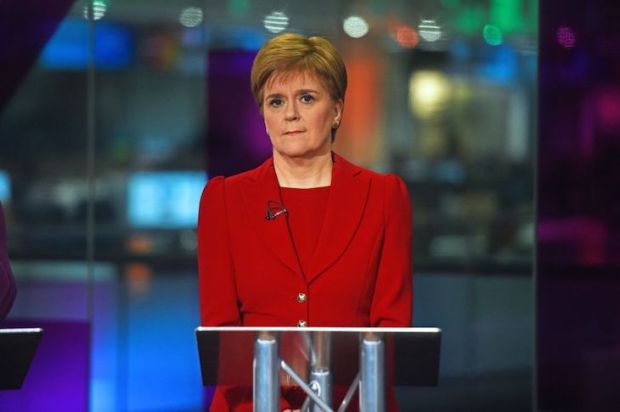Is Emmanuel Macron turning into Emperor Napoleon III? Not the great Napoleon who conquered Europe and was eventually defeated by a British-led coalition at Waterloo and exiled to Saint Helena in the south Atlantic. But his lesser nephew, whose obsession with his uncle’s glory drove him to flatulent demagoguery at home, grandiose schemes abroad and humiliating defeat at the hands of the Prussians in 1870.
Under the last monarch of France, the country descended into the revolutionary Commune, was amputated of Alsace-Lorraine and prostrated before a united and all-powerful Germany. The lesser Napoleon was eventually deposed, vilified and outlawed to Chislehurst, outside London. It was to Napoleon III that Karl Marx was referring in his famous quote:
‘History repeats itself: the first time as tragedy, the second time as farce.’
Of course Emmanuel Macron has no glorious uncle who once ruled France. But he does have a spiritual one, whom he frequently seeks to ape: Charles de Gaulle. Like Napoleon, de Gaulle cut an illustrious figure having won myriad seemingly unwinnable battles. For a time, he brought France to an apex of glory. Decline, albeit relative, has followed.
But Macron, like Napoleon III, is a young man from nowhere. And thus to quote Marx again, ‘just because he was nothing, he could signify everything save himself.’ Onto the vaporous, neither-one-thing-nor-the-other, political programme – encapsulated in the Macronistic slogan ‘en même temps’ – the young president has tried to hang Gaullist tropes: grandeur and national independence, cynicism for the ‘Anglo-Saxons’, as de Gaulle would call the present day Anglosphere. But Macron has made one grievous error in wanting to drape himself in the mantle of ‘the General’: Europe.
Emmanuel Macron’s conception of a federal Europe is at the opposite end of the spectrum to de Gaulle’s ‘Europe des patries’. What’s more, de Gaulle took on the European Commission forcefully to uphold the independence of nations within the European, largely economic, project. In 1966, he blocked the workings of the EU for a year with his ‘empty chair’ policy, not only on French agricultural interests, but also to rein in the then president of the Commission Walter Hallstein’s plans for extending its powers.
Macron is intent on doing the opposite. And yet there is a head of steam building among EU members – albeit not in the Commission – that is increasingly restless at ‘ever-closer union’. Worse still for Macron, there is growing opposition to his arrogant manner and self-serving programme on Europe’s future among the Visegrad 4, the Baltic States, the Scandinavians and rumblings among Mediterranean members. As Napoleon I discovered to his cost, uncontrollable arrogance and riding roughshod over European nations’ interests is the best gel for counter-coalitions.
In the end it was a coalition fostered by the one state that had resisted Napoleon’s European empire that brought him down. The continental blockade he sought to impose to break Britain by denying European trade with her was so damaging to continental states’ interests that they finally and decisively leagued against the Emperor.
Macron seems determined to ensure history repeats itself. Jean Castex – Macron’s beck-and-call prime minister – let the cat out of the bag in his letter cajoling the European Commission president into getting EU member states to back France in its threatened semi-blockade of British goods. The EU had to make clear, said Macron’s mouthpiece, that ‘leaving the union is more damaging than remaining in it’.
Macron may have overstretched himself here. For these words from the head of his government in an official letter lay bare what appears to have been Macron’s intention all along: that Britain has to suffer for Brexit. That may not go down well with Angela Merkel, who, though departing, will remain seriously influential over her successors and German public opinion.
Let’s see whether the EU coalition holds. Given that Emmanuel Macron has nailed his colours to the mast on driving European integration deeper, a refusal by European member states to follow suit would be embarrassing and not a good omen for his forthcoming presidency of the EU in January.
Macron has severely divided France. Were he to divide Europe over treatment of Britain and be humiliated again, as with Aukus, on the international stage his days would be numbered. It remains to be seen whether Chislehurst would still welcome a deposed emperor?
Got something to add? Join the discussion and comment below.
Get 10 issues for just $10
Subscribe to The Spectator Australia today for the next 10 magazine issues, plus full online access, for just $10.



















Comments
Don't miss out
Join the conversation with other Spectator Australia readers. Subscribe to leave a comment.
SUBSCRIBEAlready a subscriber? Log in